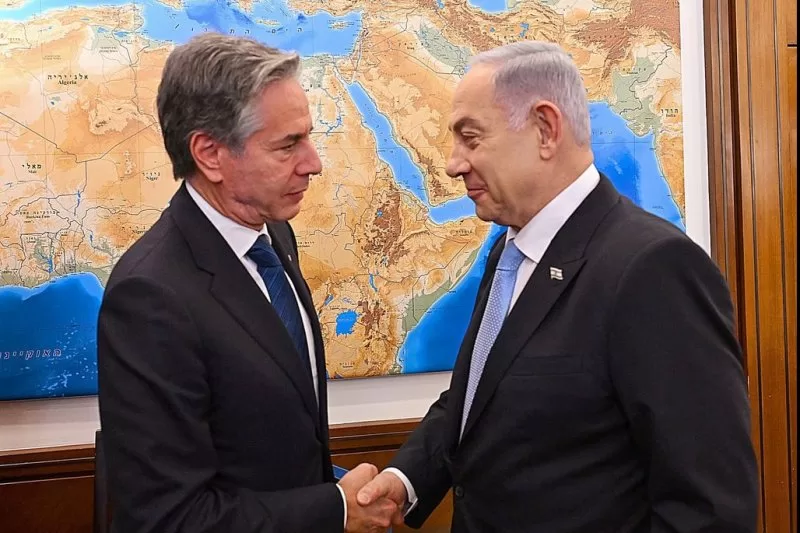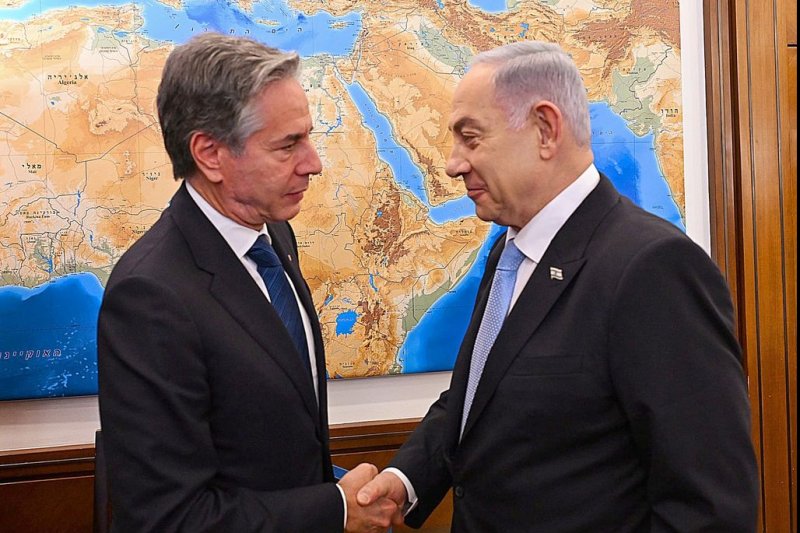Israeli Prime Minister weclomes U.S. Secretary of State Antony Blinken on Monday ahead of a meeting in Jerusalem a day after the United States’ top diplomat arrived in the country to push for a Gaza ceasefire. Photo by Chaim Tzach/Israeli Government Office/EPA-EFE
Aug. 19 (UPI) — The current talks between Israel and Hamas in Qatar could be the last chance to agree a cease-fire in the Gaza conflict and free Israeli hostages, U.S. Secretary of State Antony Blinken said Monday ahead of a meeting with Israeli Prime Minister Benjamin Netanyahu.
The indirect Egypt-Qatar-U.S.-mediated talks were “decisive” and “probably the best, maybe last opportunity to get the hostages home” and secure a durable peace, he said in a meeting with Israeli President Isaac Herzog.
“We’re working to make sure that there is no escalation, that there are no provocations, that there are no actions that in any way could move us away from getting this deal over the line, or, for that matter, escalating the conflict to other places, and to greater intensity,” said Blinken on what is his ninth trip to the region since Hamas’ Oct. 7 attacks on Israel.
“This is a decisive moment, probably the best, maybe the last opportunity to get the hostages home, to get a cease-fire and to put everyone on a better path to enduring peace and security.”
The negotiations that resumed in the Qatari capital, Doha, last week center on a last-ditch proposal announced Friday by the United States, Qatar and Eqypt designed to close final outstanding differences between the sides.
The so-called “bridging proposal” presented to Israel and Hamas was, they said in a joint statement, “consistent with the principles” in the three-stage Israeli plan put forward by U.S. President Joe Biden in May.
That plan called for an initial six-week ceasefire in which Israeli forces would withdraw from all populated areas of Gaza and women, children and elderly hostages would be released and Palestinian prisoners freed. In phase two all remaining hostages would be freed, Israel would complete its military withdrawal and commit to a lasting truce. Lastly, phase three would include the repatriation of dead hostages, Gaza reconstruction and joint U.S.-Arab nation efforts to prevent Hamas rearming.
“This proposal builds on areas of agreement over the past week, and bridges remaining gaps in the manner that allows for a swift implementation of the deal,” the statement released by the White House on Friday read.
Key sticking points are said to be around whether Israeli forces will pull out of Gaza completely, without which Hamas has said there can be no deal; allowing displaced Gazans to return to the northern part of the strip and Israel’s insistence the area remains off limits to armed men during any cease-fire.
Israel also wants an international mechanism to stop arms being moved from the south to the north and a veto over which Palestinian prisoners would be released.
The bridging proposal is said not to include Netanyahu’s demand for Israeli Defense Forces to stay on in the so-called Philadelphi Corridor on Gaza’s southern border with Egypt.
However, The Times of Israel reported mutliple outlets quoting Israeli sources saying security chiefs believe leaving the zone for the deal’s first phase would not enable Hamas to rearm to any great extent and that it could be compensated for via certain unspecified border procedures.
Washington is optimistic it can get the deal sealed, possibly as early as the beginning of next week, with Blinken expected to push Netanyahu hard when the pair sit down for face-to-face talks later Monday.
However, neither Israel or Hamas held out much prospect for a breakthrough as they traded jabs in a new blame game in which Hamas said Netanyahu was “fully responsible” for erecting fresh roadblocks to reaching an agreement, accusing him of working to prolong the conflict for his own political purposes, while Netanyahu said it was Hamas’ fault.
“It did not even send a representative to the talks in Doha. The pressure should be directed at Hamas and [its leader Yahya] Sinwar, not at the Israeli government,” said Netanyahu.

